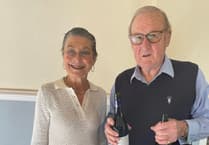THE 50th anniversary of the first successful expedition to the summit of Everest has evoked special memories for local people.
Hillary and Tenzing conquered Mount Everest on May 29, 1953, with the news breaking of their triumphant 29,000 feet climb on the eve of the Queen's coronation on June 2.
Now half a century later, and with this week's celebration of the 50th anniversary of the coronation, thoughts of the amazing feat by Sir Edmund Hillary, and later visits to Haslemere by Sherpa Tenzing, have come flooding back.
Tenzing was received by the Queen and awarded the George Medal for his achievement and was feted across the world.
In 1954, encouraged by Pandit Nehru, who became his friend and confidant, he was appointed director of field training at the Himalayan Mountaineering Institute in Darjeeling.
A strong friendship developed between Tenzing and James Kirkwood, who has lived in Haslemere for 43 years, and his late wife, June.
The 86 year old, who has lived at Petworth Road for 12 years, recalled those years.
Mr Kirkwood, an architect for more than 30 years, spent most of his career in Singapore. His wife first met Sherpa Tenzing Norgay in Darjeeling where she came to know and make friends with tea planters.
Darjeeling was Tenzing's home from the age of 18 but he was born in 1914 in Nepal where he was brought up in the shadow of highest mountain in the world. The famous Sherpa visited the Kirkwood's family home, first in Three Gates Lane, and later at Petworth Road and travelled to Haslemere on at least three occasions.
He also stayed in the town for several months in 1977, where he collaborated with the late author, Malcolm Barnes, and dictated his autobiography After Everest.
Tenzing attended a book signing some time later at Nobbs Newsagents in the High Street where Joe Nobbs recalls he sold some 50 copies of the book.
"And," remembers Mr Kirkwood, "he joined the Comrades' Club for ex-servicemen in the High Street," for the princely membership fee of five shillings which Mr Kirkwood willingly paid.
"He loved it, to be able to sit down in a club with the boys and enjoy a pint of beer."
Tenzing and his third wife Daku were firm friends with the Kirkwood family, and were often pictured with them on their visits to Haslemere.
Very fond of roses and animals, Tenzing became a recognised dog breeder in his later years.
"As the head Sherpa on the Everest expedition, he had to translate orders from the leaders to the porters. He was highly intelligent and was streets ahead in leadership qualities," said Mr Kirkwood.
And he has little sympathy for those who insist on knowing who reached the summit first, Hillary or Tenzing.
"Nobody should ever think about it, it is like going up into the loft of your home. You need two people to do it - one to hold the ladder.
"They got there together," said Mr Kirkwood.
"He corresponded with June, with his letters being written by Daku, and he signed thousands
of books," said Mr Kirkwood. "They were very good friends.
"Tenzing had a wonderful smile and perfect teeth which he cleaned with his finger and salt."
And said Mr Kirkwood: "He was a charming, modest, kind-natured and very honourable man, generous in spirit, who loved children and animals.
He died suddenly on May 9, 1986 at the age of 72 and Mr Kirkwood still has the letter from his wife Daku informing the family of his death
• The organising secretary for the famous Everest expedition was Charles Wylie, now aged 83. He has lived in Passfield with his wife Sheila since 1987.
Mr Wylie spoke to The Herald this week of his memories, still as vivid today as they were 50 years ago when he climbed 26,000ft to the base camp on Mount Everest.
"It had never been done before and it demanded a lot of effort to get two people to the top."
The expedition entailed six months of preparation said Mr Wylie, a Lt Colonel in a Gurkha regiment of the British Army and the expedition's organising secretary.
Fluent in Nepali, Mr Wylie looked after the 35 Sherpas and 350 porters attached to the 400-strong team in Nepal.
"I remember quite a lot of the expedition and I think the main thing was getting the 16 Sherpa loads to the South Col, a mountain ridge, with such a quantity of stores which had never been lifted to that height by anybody before.
"We broke the back of Everest and it meant that we could have a large support party at the South Col, for the summit teams."
It also meant that if anything went wrong said Mr Wylie the support team would be close by.
The 50th anniversary celebrations said Mr Wylie "had been quite strenuous".
Among the programme of events has been a Royal Geographical Society dinner in London with Sir Edmund Hillary, which is to be followed by a trip to Snowdonia in North Wales for a weekend reunion, an event which has taken place every five years since the expedition.
Retired from the Gurkhas for many years, Mr Wylie said he had wanted to help the people of Nepal He set up the charity Nepal Medical Trust in the UK which set up seven clinics in the hills where the Gurkhas lived, providing treatment for TB and leprosy.
First a secretary to the charity, Mr Wylie was a trustee from the start and has now been patron of the charity for 27 years.
"They do a jolly good job and we have now been asked by the Nepalese government to run other medical clinics in much of eastern Nepal.
Mr Wylie still remembers with affection the comradeship among the expedition party.
"There was wonderful loyalty from the Sherpas who did extremely well, and it inspired a lot of young people to embark on projects of endeavour," said Mr Wylie.
But he is not too sure about some of the recent so-called conquests of the mountain, where climbers use fixed ropes, erect bridges and cut steps into the ice.
"There are some phoney records, snowboarding down among them," he says. "The main thing that makes Everest difficult it not climbing it, but the altitude and shortage of oxygen. We acclimatised as much as we could.
"Nowadays it is a totally different idea, from just mountaineers wanting to climb the highest mountain in the world.
"We didn't know whether we could go that extra 1,000 feet into the unknown and cope with the extra altitude difficulties."



